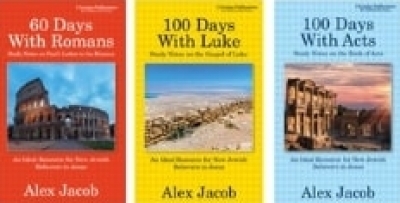Whilst there is no shortage of detailed theological commentaries on the New Testament or works exploring its original Jewish context, this short series of study notes nevertheless potentially addresses a gap which has needed filling. Alex Jacob, CEO for CMJ (The Church’s Ministry among Jewish People), has written specifically to encourage and strengthen new Jewish believers by helping them engage with three books which are representative of, and particularly important to, the New Testament canon – a Gospel, a letter and the historical record of Acts. His decision to write on Luke’s Gospel is apparently influenced by the richness of its material and its ability to speak to people of diverse backgrounds. Romans, with its focus on how the Gospel relates to both Jews and Gentiles, and its rebuttal of replacement theology, is an obvious choice.
Hebraic outlook on faith
In style, the approach is reminiscent of ‘Every Day with Jesus’, with readers taken through each volume in a series of leisurely and reflective daily studies, enriched with important historical and cultural details. However, they are more than just theological introductions. They subtly present a particularly Jewish and biblical outlook on faith – namely, that believers should not just be hearers of the word, but doers of it (contrasting with a common Christian Greek mindset of knowledge for its own sake). For example, when writing on Peter’s healing of Tabitha, the reflection for the day is “How can we cultivate faith and boldness in our prayers for healing?” Even when exploring events that particularly address Jewish believers, the author does so in a manner which is also inclusive towards Gentiles. The story of Paul’s willingness to teach a small group of women at Philippi, where anti-Semitic persecution had left the Jewish community unable to form a minyan1 of male synagogue members, is used to encourage us all to be grateful for whatever opportunities the Lord may present us with.
Inclusive terminology
Jacob’s inclusive approach extends to religious terminology, but never at the expense of sound theology. He unpacks the particular significance of the Passover as Jesus’ last meal before his death, but elsewhere uses traditional Christian terms, such as the Lord’s Supper, Eucharist and Holy Communion. Similarly, whilst generally referring to the Holy Spirit, he often uses the Jewish term ‘ruach’ in the study heading. The author rightly concentrates entirely on the New Testament, carefully avoiding getting side-tracked into deeper Jewish theological debate. But he does provide useful details on the beliefs of various Jewish religious groups of the period (such as the Essenes) where relevant. The bibliography includes many helpful reference works for readers wishing to go further, including David Stern’s ‘Jewish New Testament Commentary’.
Addressing anti-Semitism
As the author of ‘Enlargement Theology’ - a significant contribution to the debate on Jewish-Christian relations based on key chapters of Romans - it is unsurprising that Jacob’s study notes on that book are the most theological of the series. Nevertheless, he still manages to write in a way that is accessible to new believers. Importantly too, he does not shy away from addressing the tough issue of anti-Semitism, drawing out biblical references which many readers would probably overlook, but which still resonate powerfully today. For example, after Paul expelled an evil spirit from the fortune-telling slave girl, the chief accusation made against him and Silas to whip up a frenzied mob was that “These men are Jews”.
Additional features
Jacob strongly encourages readers to gain maturity in the faith by searching the Scriptures for themselves. Therefore, each volume includes guidelines for reading the Bible and applying it to our own lives. He also provides a brief overview with themes and background to the New Testament book in question, and for Acts and Romans gives a helpful historical timeline for reference. Perhaps most importantly, considering Jacob’s target readership, each study series opens with a short article on Jesus as a Jew, and the meaning of Jewish identity today: an encouragement to take Jesus seriously and to move past the formidable obstacle of historical Christian anti-Semitism.
Uniting Jew and Gentile
The apostle Paul devoted his life to fulfilling the Lord’s deep desire to unite Jew and Gentile as ‘one new man’ in Messiah Jesus. With this series of booklets, Alex Jacob undoubtedly contributes to this on-going process of healing and reconciliation which is so close to our heavenly Father’s heart. This faith-building, back-to-basics encouragement to consider New Testament books in their Jewish context is therefore one which deserves wider consideration in the body of Christ, for example, as the basis for home group studies or following up Alpha and similar courses.
‘100 Days with Luke’; ‘100 Days with Acts’ and ’60 Days with Romans’ (145, 152 and 112 pages respectively) are all published by Christian Publications International, and are available from CMJ
1. A quorum of ten men over the age of 13 required for traditional Jewish public worship
